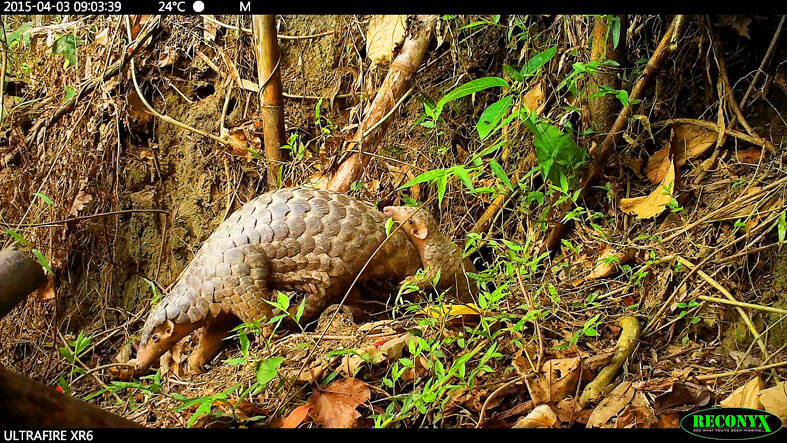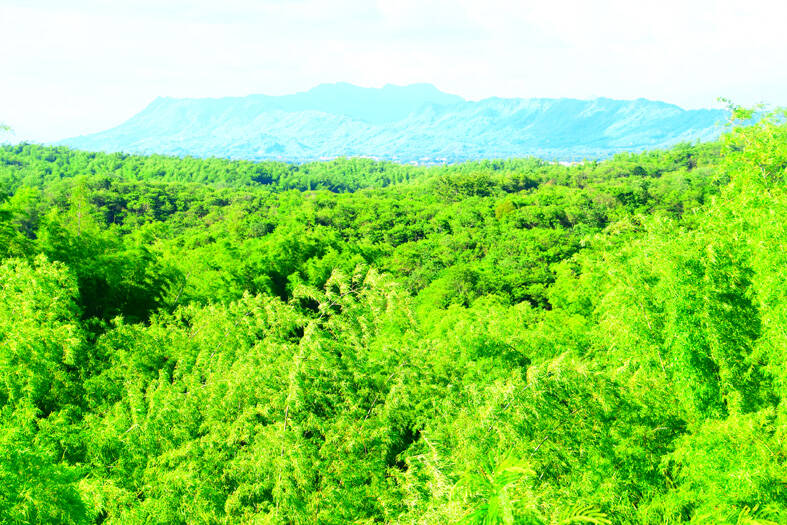From its status as a “pangolin purgatory” in the previous century, Taiwan has transformed itself into the world’s leading bastion for the scaly anteater, even if risks remain.
Extending in all directions from the 24.5km marker along Kaohsiung’s Provincial Highway No. 28 is a seemingly endless forest of inhospitable thorny bamboo. Matou Mountain (馬頭山) stands nearby, the terrain a stretch of badlands rising to 300m above sea level.
The carpet of decaying leaves is home to colonies of ants and termites, making it the perfect place for pangolins.

Photo courtesy of Sun Ching-min
“These days pangolins are rare around the world, but Taiwan has about 20,000 by rough estimates,” said “Dr Pangolin” Sun Ching-min (孫敬閔), an assistant professor of wildlife conservation at the National Pingtung University of Science and Technology.
“Especially in Taitung County’s Luanshan (鸞山) area, there are about 12 pangolins every square kilometer, making it potentially the greatest density in the world,” he said.
The figures are only general estimates, as understanding of the habits of reclusive and nocturnal pangolins is limited. To measure their numbers, researchers must count their burrows and see how many are captured on wildlife cameras.

Photo: Su Fu-nan, Taipei Times
In one 100m-radius banana grove on Matou Mountain alone, Sun once found 30 to 40 burrows.
Locals often have run-ins with the scaly mammals, their numbers having now risen to a level “beyond imagining,” Sun said.
Over the past three years, the Matou Mountain Natural Humanism Association has counted 16 pangolin killings by stray dogs, while five were struck by vehicles.
Pangolins are the only known mammals with large keratin scales that cover their skin, which is one reason for their popularity in the illicit wildlife trade.
They are present in the folklore of many cultures and were hunted by the early inhabitants of Taiwan, but it was Japan that developed leatherworking techniques using pangolin scales. In China, their meat is believed to promote blood circulation, while the scales are said to promote lactation in addition to their beauty and durability as a leather.
The 1950s to the 1970s were the peak of pangolin leatherworking in Taiwan, with 5,000 hides exported every month. In the 1980s, stores offering alpine products in Taiwan sold more than 2,000 pangolins per year.
More than a decade of serious hunting decimated the wild pangolin population, and it is still listed as endangered today.
Then, in 1989, Taiwan enacted the Wildlife Conservation Act (野生動物保育法) banning the poaching and sale of endangered species, making the nation one of the world’s few conservation grounds for pangolins.
Through more than three decades of concerted effort by the government, private organizations and individuals, Taiwan is believed to have achieved the highest population density of pangolins in the world.
Since June last year, Sun has been tracking the activity of four pangolins on Matou Mountain to better understand their development, habits and diet.
Pangolins are skilled ant hunters, with tens of thousands of ants and termites found in just one pile of feces, he said.
From his findings, Sun estimates that one pangolin eats 30 million ants in a year, while previous research shows that pangolins in eastern Taiwan eat more than 70 types of ants and four types of termites.
“Although Matou Mountain pangolins do have such a variety of ants to eat, the ones they have are delicious,” Sun said. “The Odontotermes formosanus, which emerges in the south after the plum rains, has a 50 percent fat content that can improve milk nutrition for nursing pangolin mothers.”
Although they have no natural predators in Taiwan, pangolins still face myriad dangers, including vehicles, animal traps and stray dogs, Sun said.
The estimated 160,000 stray dogs roaming the nation’s mountains are known to attack pangolins, especially their tails, which are used by mother pangolins to carry their young, he said.
Without a functioning tail, pangolins are less competitive and have trouble raising their young, perhaps leading to premature death, Sun said.
While conceding that the stray dog issue is hard to solve in the short term, Sun said people can help to reduce their numbers, including by refraining from feeding them.
He said he also supports moving them from sensitive areas such as Matou Mountain to better protect pangolins and other threatened creatures.

Taiwan is stepping up plans to create self-sufficient supply chains for combat drones and increase foreign orders from the US to counter China’s numerical superiority, a defense official said on Saturday. Commenting on condition of anonymity, the official said the nation’s armed forces are in agreement with US Admiral Samuel Paparo’s assessment that Taiwan’s military must be prepared to turn the nation’s waters into a “hellscape” for the Chinese People’s Liberation Army (PLA). Paparo, the commander of the US Indo-Pacific Command, reiterated the concept during a Congressional hearing in Washington on Wednesday. He first coined the term in a security conference last

Prosecutors today declined to say who was questioned regarding alleged forgery on petitions to recall Democratic Progressive Party (DPP) legislators, after Chinese-language media earlier reported that members of the Chinese Nationalist Party (KMT) Youth League were brought in for questioning. The Ministry of Justice Investigation Bureau confirmed that two people had been questioned, but did not disclose any further information about the ongoing investigation. KMT Youth League members Lee Hsiao-liang (李孝亮) and Liu Szu-yin (劉思吟) — who are leading the effort to recall DPP caucus chief executive Rosalia Wu (吳思瑤) and Legislator Wu Pei-yi (吳沛憶) — both posted on Facebook saying: “I

The Ministry of Economic Affairs has fined Taobao NT$1.2 million (US$36,912) for advertisements that exceed its approved business scope, requiring the Chinese e-commerce platform to make corrections in the first half of this year or its license may be revoked. Lawmakers have called for stricter enforcement of Chinese e-commerce platforms and measures to prevent China from laundering its goods through Taiwan in response to US President Donald Trump’s heavy tariffs on China. The Legislative Yuan’s Finance Committee met today to discuss policies to prevent China from dumping goods in Taiwan, inviting government agencies to report. Democratic Progressive Party Legislator Kuo Kuo-wen (郭國文) said

Sung Chien-liang (宋建樑), who led efforts to recall Democratic Progressive Party (DPP) Legislator Lee Kun-cheng (李坤城), was released on bail of NT$80,000 today amid outcry over his decision to wear a Nazi armband to questioning the night before. Sung arrived at the New Taipei District Prosecutors’ Office for questioning in a recall petition forgery case last night wearing a red armband bearing a swastika, carrying a copy of Adolf Hitler’s Mein Kampf and giving a Nazi salute. Sung left the building at 1:15am without the armband and covering the book with his coat. Lee said today that this is a serious